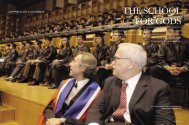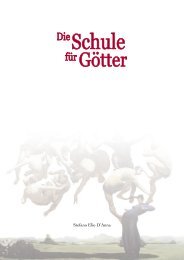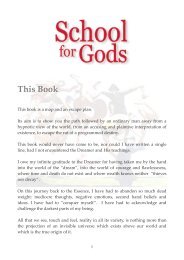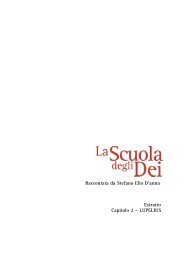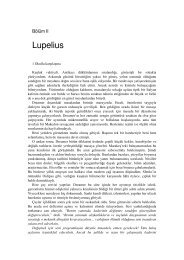Lupelius - The School for Gods
Lupelius - The School for Gods
Lupelius - The School for Gods
- No tags were found...
Create successful ePaper yourself
Turn your PDF publications into a flip-book with our unique Google optimized e-Paper software.
By using the techniques of fasting and breathing, by adopting a new vision, new ideas andmaking special ef<strong>for</strong>ts, a man can change himself and the situations he finds himself in. Hecan make the transition from an incomplete being, mortal and ridden with conflict, to onewho is whole, harmonious and immortal.Every deprivation, every ef<strong>for</strong>t made towards frugality, is part of the preparation <strong>for</strong> ourescape from the hell of ordinariness, freeing us from the emotional encrustations built upover the years. According to <strong>Lupelius</strong>, only a man from the <strong>School</strong>, guided by a flawlessteacher, can confront such a healing process and overcome the hurdles and obstacles of suchan undertaking.Man is generally incapable of understanding the signs that announce and accompany anact of purification. Ordinary men read these in reverse and rather than seeing them as signs ofhealing, perceive them to be a true sickness. <strong>The</strong> pain involved in the ef<strong>for</strong>t required issomething no one wants to face. This is why, according to <strong>Lupelius</strong>, every act of abstinence isabandoned just when it starts to work.Through his long voyages, intense study and tireless research, <strong>Lupelius</strong> had got to know theancient schools of initiation and had met extraordinary men who belonged to the great asceticschools and mystic traditions. In every age and in all civilizations, otium, the art of not doing,had been the mainstay of every discipline and inner search; the golden thread that kept everyman who aimed at the conquest of the highest levels of responsibility committed to the greatadventure.Following the ideal map indicated by the manuscript, the abstinence of the ascetic, thesolitude of the hermit and the frugality of the monk, revealed themselves to be expressions ofa single <strong>School</strong>, different aspects of one, timeless quest that was connected to the martialdisciplines and to the wakefulness of the warrior.Upon further investigation, I discovered that Arriano, one of the two historians whofollowed the exploits of Alexander the Great, had, in the ‘Anabasis Alexandrou’, summed upthe dietary rules and the secret of his boundless energy in a single sentence: “…he had beentrained to be frugal: <strong>for</strong> breakfast, a march be<strong>for</strong>e dawn, <strong>for</strong> dinner, a light meal.” <strong>The</strong>Macedonian warriors themselves, considered throughout all antiquity to be the unmatchedmodels of bravery and strength, were of legendary frugality. <strong>The</strong>y slept on the naked earthand, even at times of extreme endurance and while undertaking the most dauntingendeavours, would eat only a handful of olives. And yet, they were tireless, the mostfearsome of warriors, a true nightmare <strong>for</strong> their enemies.<strong>The</strong> deliberate elimination of just one gram of food and abstinence from just one minute ofsleep were, in <strong>Lupelius</strong>’ opinion, so powerful as to cast serious doubt on man’s entire systemof beliefs and upset his artificial equilibrium. His <strong>School</strong> advocated the absence of sickness,old age and death as an inalienable birthright and natural condition of man.A diseaseless, ageless, deathless man.Since the beginning of time, throughout the centuries and in all traditions, the quest <strong>for</strong>self‐mastery had required practice and discipline, intended as a means by which to bring to32



